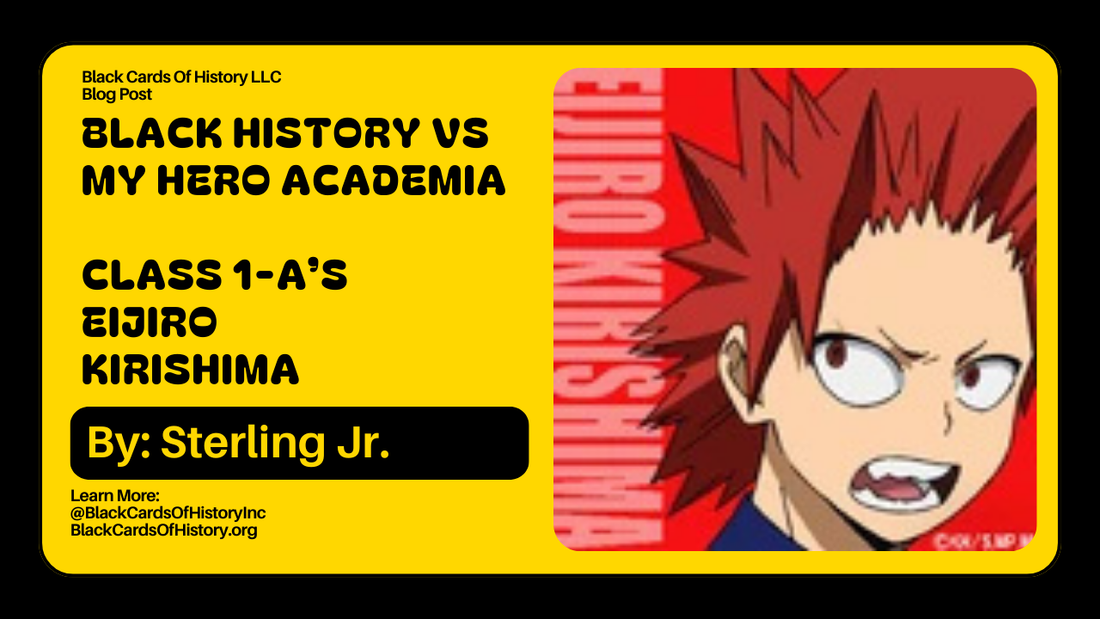Eijiro Kirishima and the Power of Integrity: How Black History Fuels Real Strength
Rise Beyond Legacy x My Hero Academia Final Season Preblogs
By Sterling, Founder of Black Cards Of History LLC
Introduction: Loyalty Isn’t Passive—It’s Loud
There’s something raw and admirable about Eijiro Kirishima’s take on strength. In My Hero Academia, his idea of “manliness” is never about dominance—it’s about honor, showing up, and backing up your words with action. When I think about the kind of ally Black History Month deserves, Kirishima immediately comes to mind. His fiery heart, unwavering loyalty, and hunger to do right by others would make him not just a participant—but a protector of the month’s integrity and meaning.
Kirishima reminds me of the kind of people we need more of in real life: those who recognize their platform and choose to amplify others. Not to speak for the marginalized, but to speak with them and, more importantly, to make space so their voices can rise.
Section One: Strength Through Adversity—A Showcase, Not a Soundbite
Kirishima would be the one organizing an exhibit or interactive experience titled “Strength Through Adversity.” Think about it: a student-led showcase filled with visuals, storytelling, and immersive panels that explore the resilience of Black leaders. His approach wouldn’t be about performative allyship—it would be deeply personal.
He would curate stories that reflect the kind of grit he admires: Harriet Tubman navigating through danger to free others, Malcolm X standing firm in his transformation, Shirley Chisholm demanding her seat at the table, and John Lewis causing “good trouble” because silence was never an option. Every panel would ooze with the message: “Strength isn’t just physical. It’s the courage to stand tall in the storm.”
That’s the kind of energy Kirishima brings, and it aligns with how many of us see Black history—not as trauma tourism, but as triumph born from pressure, like diamonds.
Section Two: Black Excellence is Not a Footnote
I believe Kirishima would connect with the economic justice component of Black excellence, too. He’s the kind of person who’d see how systems have historically worked against Black communities and would want to fight alongside those calling for real change. His version of justice is proactive—you don’t just stand there when something’s wrong; you do something.
He’d likely bring attention to Black entrepreneurs and creators who are reshaping industries—those building generational wealth despite systemic setbacks. Names like Madam C.J. Walker, Robert F. Smith, and Issa Rae would not be overlooked. Kirishima would make sure his peers understood: Black history isn’t just about the past—it’s a blueprint for the future.
Section Three: His YouTube Assignment – “Black Heroes Who Embody Real Strength”
If Kirishima had a YouTube channel for this project, his energy would be contagious. His video would be called “Black Heroes Who Embody Real Strength.” Picture this: red lighting to match his crimson hair, him pacing as he speaks passionately, clips and images of historical figures woven in between.
He’d open with:
“Strength isn’t just muscles and hard punches—it’s surviving when the world says you shouldn’t. It’s choosing compassion when rage feels easier. And it’s pushing forward, even when your path is blocked.”
Then he'd spotlight people like Frederick Douglass, whose intellect cut through chains; Claudette Colvin, a teenage girl who said no to injustice before Rosa Parks; and Bayard Rustin, a Black gay man who organized the March on Washington with little recognition.
Kirishima’s content would be full of humility and fire. He’d make sure the message reached not just minds, but hearts.
Conclusion: Standing Up, Not Standing By
What makes Kirishima’s hypothetical involvement in Black History Month so beautiful is that he wouldn’t do it for praise. He’d do it because it’s right. And that kind of character—someone willing to question their own privilege, to study deeply, and to stand up for others—is exactly the kind of energy we need in conversations around Black history, equity, and justice.
In a time where being performative is easy and being quiet is safer, Kirishima would lean in, speak up, and use his strength the way real heroes do: to hold the line for others.
This is what Rise Beyond Legacy is all about. It's about connecting fictional resolve to real-world responsibility. And with someone like Kirishima at the forefront, that legacy?
Yeah, it’d be unbreakable.

